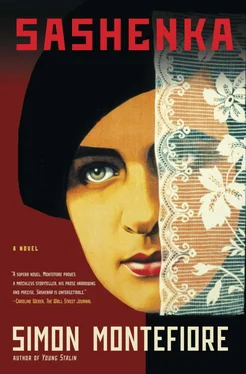“Welcome, Gospodin Getman! Your usual table in the alcove? Sir and mademoiselle, please follow me!”
Getman’s three bulky, shaven-headed bodyguards, tattoos peeping over their shirt collars, sat at the neighboring table. Katinka followed Pasha, noticing that he walked like a juggling bear with his paw-like hands ready to catch the balls.
“I haven’t got long,” said Pasha when they were seated.
“I didn’t know you were here. I thought you were in London.”
“Water?” Pasha reached for the water and spilled it. Waiters rushed to clear up but he did not seem to care. “I came home again. There’s going to be an election soon. The President needs our help—we must keep out the Communists. Mama’s on her way back from London. You understand that this is her last chance to find out who she really is. Imagine not knowing, Katinka! I knew my parents so well, so intimately, but she has always this burning sense of loss inside her. Do you know your parents?”
“Of course.”
“Happy childhood?”
She nodded, unable to conceal her pleasure in the thought. “My father’s a doctor. They really love me and we live with my grandparents in their old house.”
“We’re so lucky, you and I. Now I know you’ve been talking to Mama”—Katinka was amused that this bear of a billionaire in his mid-thirties still called his mother “Mama”—“but I’d like to know myself what you’ve found so far.”
As Katinka explained, Pasha’s mobile phone continued to ring. Once the bodyguards took a call and gave him a message; a red-haired girl in a leather miniskirt and Chanel boots and belt greeted him; and several businessmen came to shake hands—but navigating these interruptions, she managed to reveal her story. While she talked, Pasha leaned forward and listened to her, chewing on his cigar, his sharp, dark eyes looking straight into hers.
“So Satinov does know something but he’s very old and mysterious. Typical of that generation for whom secrecy is a fetish. You’re doing well.”
Katinka flushed with pleasure. “But the documents were incomplete and I met with the KGB to discuss the ones that were missing and I’m so embarrassed—and of course, I told them it wasn’t possible—but they asked…”
“Asked what?”
“For money! It’s disgusting!”
“How much?” asked Pasha.
“I told them it was ridiculous.”
“Look,” said Pasha, “I don’t mean to sound…I’m older than you so…I’m sorry I lost my temper in London. Mama told me off. But you’re so unworldly. I meet a lot of greedy girls. I understand you’re not like that. Mama says too that you’re not doing this for the money—that you genuinely want to help us. So I hope you’ll keep working on this day and night. How much do they want?”
“But we shouldn’t pay them,” Katinka objected. “Not the Organs! These are not decent people.”
“Just tell me how much they’ve asked for.”
“They mentioned…it’s so much, it’s a crime and they’re Mafiosi…,” she sighed. “Fifteen thousand dollars. A sin! What has happened to Russians these days?”
Pasha shrugged, the juggling paws opening and closing. “Well, this is my gift to Mama. Truth is expensive, but I think family is priceless. Understand that, understand everything. I’ll pay it.”
“No.”
“Stop telling me what to do!” he growled and crumpled up the tablecloth, almost sending all the cups to the floor. “It’s my money, and we need their information.”
“Well, OK…,” Katinka said at last. “And there’s one other thing. Satinov gave me this and said I must meet this person and not leave it too long.” She handed over a scrap of paper.
“But this is a Tbilisi number. In Georgia.”
“Yes.”
“Well, what are you waiting for? You must go immediately, Katinka.”
“Now?”
“Sure, pick up your passport and suitcase from the hotel. When you get back, I’ll give you the cash and you can meet your KGB crooks.” He dialed on his cell phone. “It’s me. Book a flight to Tbilisi for this afternoon. Four o’clock? Fine. Ekaterina Vinsky. Put her in the Metechi Palace Hotel. Bye.” He called to the next table. “Hey, Tiger!” One of the bodyguards lumbered over. “Take Katinka back to the hotel and then on to Sheremetyevo. Right now.”
It was already dark in Tbilisi—once known as Tiflis—when Katinka arrived at the airport, a bazaar of shouting taxi drivers, gunmen, traders, soldiers and footpads. But there was a driver waiting for her with a sign that read Vinsky —and a Volga that apparently could only be started with two wires and a hummed song. As they drove into town, the gunshots of a small wild land in the midst of a civil war ricocheted over the half-lit city. The Metechi Palace Hotel, an ugly modern construction with glass elevators and a big open foyer with ranks of green metal balconies reaching up toward a giant skylight, was patrolled by Georgian gunmen in glittery gun holsters toting battered Kalashnikovs.
Leaving her bags at the hotel, Katinka caught a taxi into the city, passing through checkpoints manned by militiamen of motley uniform belonging to any of several private armies. The police themselves looked shabby and lost in their own city. The buildings were grandly decayed, and the streets had the flavor of a Levantine dream of a Paris that never was.
Katinka had never been to Georgia—her family spent their holidays in Sochi on the Black Sea—but she had heard a lot about it, of course: the fruit basket, the wine barrel, the playboy capital, the jewel in the crown, the pleasure dome of the Soviet Imperium with its luscious harvests of grapes and vegetables, its sulphurous Borzhomi water in those famous green bottles, its earthy red wines, its privileged, corrupt Communist bosses who lived like sultans, its argumentative intellectuals and its flashy Casanovan lovers. But Georgia had its dark side too. It had produced Stalin and Beria—and other famous Communists with unpronounceable, slightly ridiculous Georgian names: Sergo Ordzhonikidze, Abel Yenukidze—and Marshal Hercules Satinov.
The taxi took her right to the city center through Freedom Square (once Yerevan Square under the Tsar, then Beria Square, then Lenin Square) and into the broad and handsome Rustaveli Avenue (Golovinsky during Tsarist times) with its theaters and palaces. The driver did not know the way to the house she wanted: he shouted at people to ask. He turned the car round, oblivious to the hooting traffic, and showed her the burnt-out wreck of the Tbilisi Hotel, once the grandest south of Moscow. Finally they stopped on a steep cobbled hill, beneath a church with a round tower in the Georgian Orthodox style, and the driver pointed into the dark.
“There!”
Katinka paid him in dollars then walked carefully down the darkened street. Behind high walls the mansions were embraced by long-fingered vines, their courtyards overhung by flower-draped balconies where laughter and lanterns flickered. A bearded man with the thick white hair that Georgians never seem to lose held up a lantern.
“Where are you going? Are you lost?”
She saw he had a shotgun but did not feel afraid. “Café Biblioteka?” she asked.
“Come on!” His Russian was abysmal but he took her arm and led her down the cobbled street until they reached a house almost completely concealed in the vines. He opened the wooden double doors into a crumbling marble hall, lit with a candle, that reeked of Georgian feasts. To the right was a large shabby door and he pushed it open, jabbering in Georgian, the shotgun angled alarmingly over his shoulder. “Come on! Here is Café Biblioteka!”
With a gasp of wonder, Katinka entered the café, in the flickering light of candles decorated with wings of wax. She thought it smelled delicious: of tkemali , ginger, apple and almond. It was an old library, the bookshelves still standing in between the tables and behind the bar. Maps, banners of Tsarist Guards regiments, Georgian brigades and Bolshevik workers, drawings, noble and obscene, paintings, icons, pieces of old Georgian uniforms, swords and daggers, busts of Mozart, Queen Tamara, Stalin and Roman senators covered the walls. Some of the bookshelves had rotted and collapsed, tossing their priceless antique volumes onto the floors, where they lay, their yellow parchment pages open like fans.
Читать дальше












